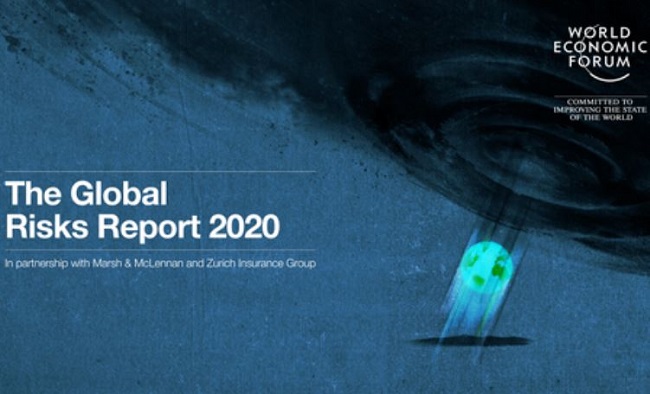Global risks 2020
27 January 2020
Risk is of critical importance to internal auditors. It is at the heart of our assurance and advisory work. Read on for a snapshot of the top risks your organisation and your audit plan should be addressing.
Each year in Davos, Switzerland, the annual World Economic Forum (WEF) thought leadership event brings together the worlds of commerce, charity, politics, science, activism and academia. It also publishes a Global Risk Report 2020.

Top global risks
For the first time in its 15-year history, the top five risks in terms of likelihood all relate to one category – climate change and related environmental issues.
In terms of impact, weapons of mass destruction is the only non-climate related risk to feature for the fourth year running, although it has dropped into second place behind climate action failure. A clear sign of the magnitude of the threat.
| Impact | Ranking | Likelihood |
| Climate action failure | 1st | Extreme weather |
| Weapons of mass destruction | 2nd | Climate action failure |
| Biodiversity loss | 3rd | Natural disaster |
| Extreme weather | 4th | Biodiversity loss |
| Water crises | 5th | Human-made environmental disasters |
- What climate change and related environmental risks has your organisation identified?
- Is climate risk a priority is your sector?
The Institute’s Risk in Focus 2020 highlighted that of the 528 chief audit executives surveyed across Europe, environment and climate change was only a top five risk for 14% of organisations. Even more concerning is that less than 30% thought it would be in their top five over the next five years.
- Why is this?
- What are you doing to raise awareness of climate risks?
- Are you providing climate governance assurance to your board?
Key insights
The report recognises turbulence is the new normal and that “on key issues such as the economy, the environment, technology and public health” leaders must start working collectively to find solutions as “the world cannot wait for the fog of geopolitical and geo-economic uncertainty to lift.”
Financially, “the global economy is at risk of stagnation.” Business leaders surveyed identified “fiscal crises” as the top-rated risk for businesses with increasing concern for asset bubbles as “rising trade barriers, lower investment and high debt are straining economies around the world.”
In 2019 societal unrest was seen on almost every continent, often fuelled by social media. The report notes that “the profound political consequences of inequality can also undermine economic growth by making a country harder to govern.”
The WEF calls 2020 a critical year for the future of climate change mitigation. As with the Institutes recent Audit & Risk feature, the report focuses on climate risk, stating that “the next 10 years will shape the outlook for climate risk for the rest of the century.” The report also looks at the opportunities to stem the climate emergency through nature and “how destabilising tipping points in nature could exacerbate the social and economic consequences of climate risk.”
Experts suggest that the next wave of 4IR (fourth industrial revolution) technologies will dramatically reshape economies and societies. However, the current lack of global technology governance and the presence of cybersecurity blind spots increase the risk of a fragmented cyberspace and competing technology regulations. The associated technological, economic and societal risks are discussed in detail.
Finally the report warns that health systems across the globe are “at risk of becoming unfit for purpose.” A broad range of issues are outlined from vaccine hesitancy and drug resistance through to the pressures of addressing mental illness and the leading cause of deaths now being non-communicable diseases rather than infections.
Internal audit relies on quality risk information to provide assurance that matters, not that just ticks a box. The WEF risk report highlights the interconnections between risks. It amplifies the relevance of individual risks and their part in the bigger picture.
Call to action
Read the report
Share the report
Ask yourself
- How ambitious is your internal audit plan for 2020?
- Is your organisation’s risk process capturing all the risks?
- What are you doing about climate risk?
Further reading
WEF Regional Risks Report 2019
UN 17 Sustainable Development Goals








